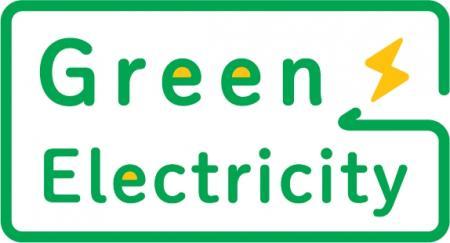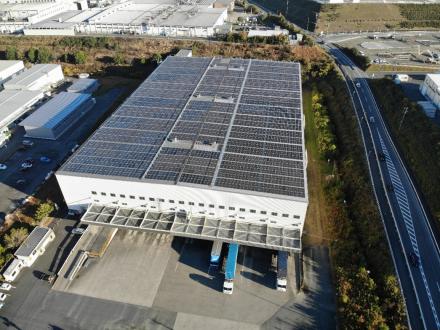News Release
Yokohama Rubber begins production of ADVAN Sport EV, an EV-dedicated tire, powered by a proprietary solar panel power generation system and procured renewable energy
2023.September.15
- Management relation
- Sustainability relation
Hiratsuka, Japan—The Yokohama Rubber Co., Ltd., announced today that its Shinshiro-Minami Plant (in Shinshiro City, Aichi Prefecture) has begun production of its ADVAN Sport EV ultra-high-performance summer tire for premium electric vehicles (EVs) and other high-performance tires with electric power from a new proprietary solar panel power generation system put into official operation this August and renewable energy-generated electricity (hereafter, renewable-energy electricity) that the plant has been procuring since April.
The new solar panel power generation system has an output of about 1.1 MW and is projected to generate about 1,469 MWh per year while reducing CO2 emissions by about 599 tons per year. The new system is receiving subsidies under the Japanese Ministry of the Environment’s FY2021 Subsidy for CO2 Emission Control Measures (Project to Promote the Acceleration of Communities' Use of Renewable Energy and Stronger Energy Resilience through Use of Power Purchase Agreements (PPA), etc. [Project to Promote Price Reduction of Solar Power Generation Equipment, etc. to Achieve Storage Parity])*1.
The renewable-energy electricity being used at the Shinshiro-Minami Plant is considered to be derived 100% from renewable energy sources and deemed to generate zero CO2 emissions as electric power provider Chubu Electric Power Miraiz Co., Inc. has procured FIT non-fossil fuel certificates with tracking information*2 and non-FIT non-fossil fuel certificates with renewable energy attributes*3 for the electricity being provided to the plant. The Shinshiro-Minami Plant’s shift to renewable-energy electricity is expected to reduce the plant’s annual CO2 emissions by about 570 tons.
Yokohama Transformation 2023 (YX2023), Yokohama Rubber’s medium-term management plan for fiscal years 2021–2023, includes sustainability initiatives that are based on the concept of “Caring for the Future.” Yokohama Rubber believes that conducting business activities aligned with its sustainability initiatives will help resolve social issues and lead to the continued increase of its corporate value.
Yokohama Rubber is aiming to realize carbon neutrality and has set a long-term target of achieving net zero CO2 emissions by 2050. As part of this effort, the company aims to turn its Shinshiro-Minami Plant, its main plant for high-performance tires for passenger cars, into a carbon-neutral model plant with zero CO2 emissions by 2030. In addition to its new solar panel power generation system and use of renewable-energy electricity, Shinshiro-Minami Plant is now using natural gas as boiler fuel. The plant also will begin full-scale production of tires that contribute to carbon neutrality. From 2030 onwards, Yokohama Rubber plans to use the know-how accumulated at Shinshiro-Minami at its other plants in Japan and other countries as it aims to all production sites carbon neutral by 2050.
*1: This project subsidizes a portion of the expenses required by projects that aim to achieve storage parity by installing solar power generation and storage batteries for self-consumption through on-site PPA models etc.
*2: FIT non-fossil fuel certificates are certificates of the environmental value of energy generated from non-fossil renewable energy sources that are subject to the FIT (Feed-In Tariff) system, including solar, wind, small hydropower, and biomass. FIT non-fossil fuel certificates with tracking information include a tracking function that provides such information as the specific power source and the type of power source linked to the production site. FIT non-fossil fuel certificates with tracking information can be used by companies to report their progress in advancing the use of renewable energy to such international organizations as RE100, a global corporate renewable energy initiative bringing together companies committed to using 100% renewable-energy electricity in all their business activities; CDP, a non-profit organization that aims to realize a sustainable economy; and the Task Force on Climate-related Financial Disclosures (TCFD).
*3: Non-FIT non-fossil fuel certificates with renewable energy attributes are awarded to renewable energy sources that are not subject to FIT, such as large hydropower plants.

Logo for renewable energy procured from Chubu Electric Power Miraiz



